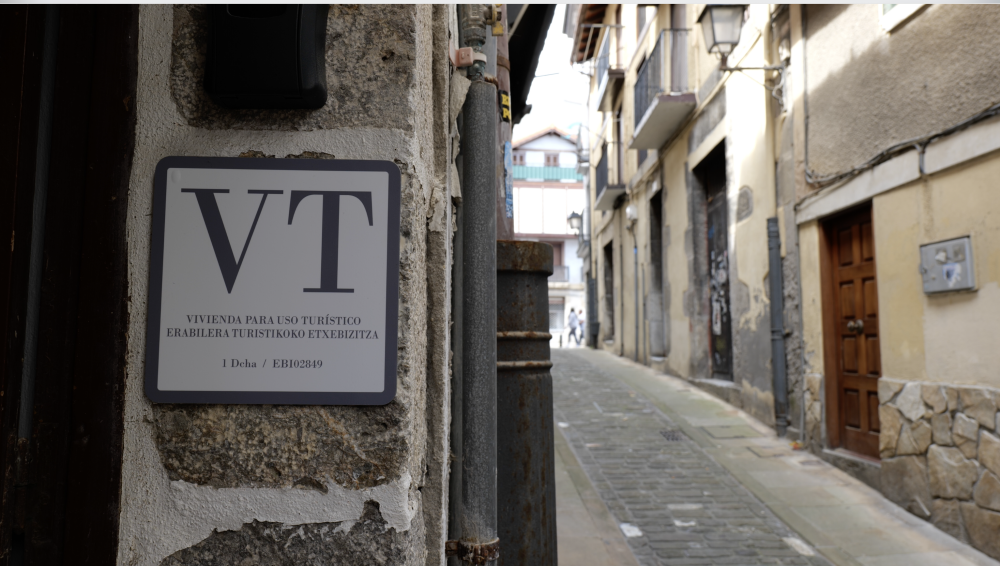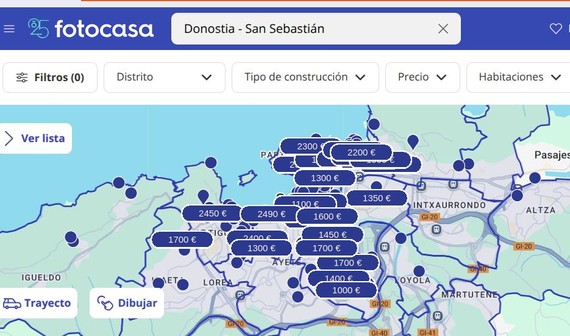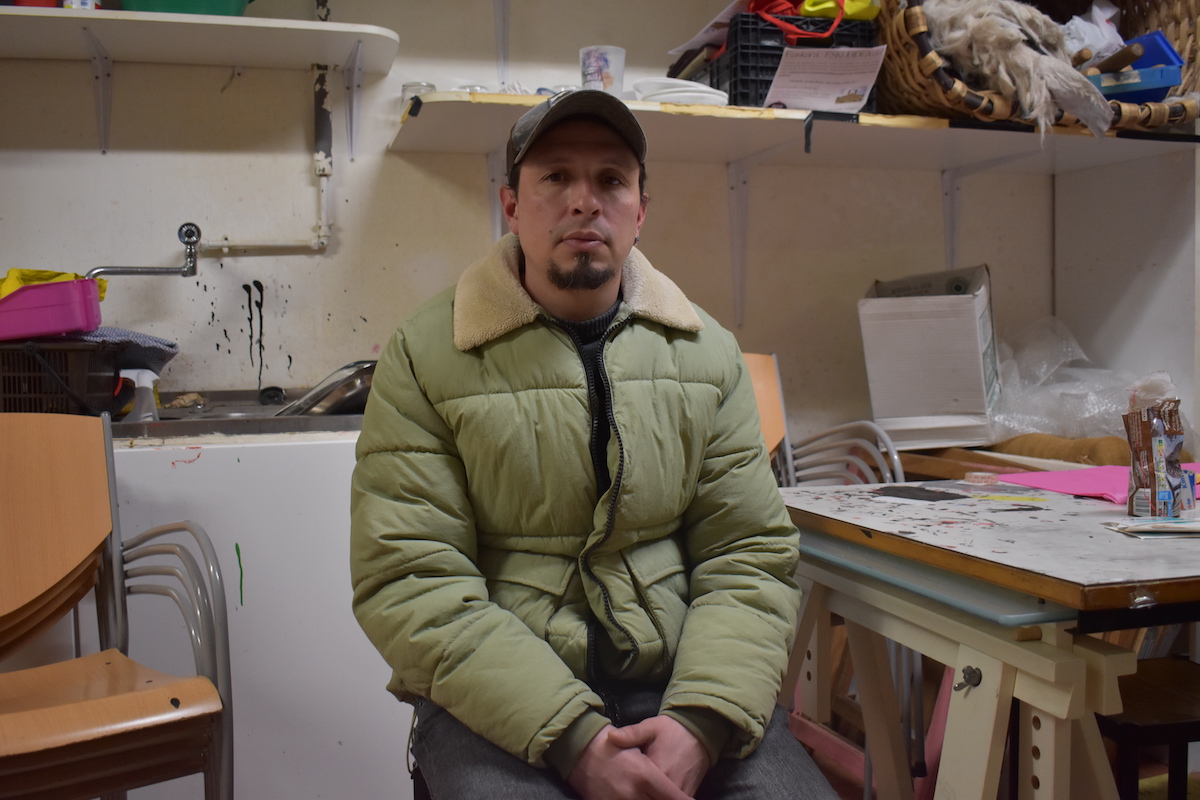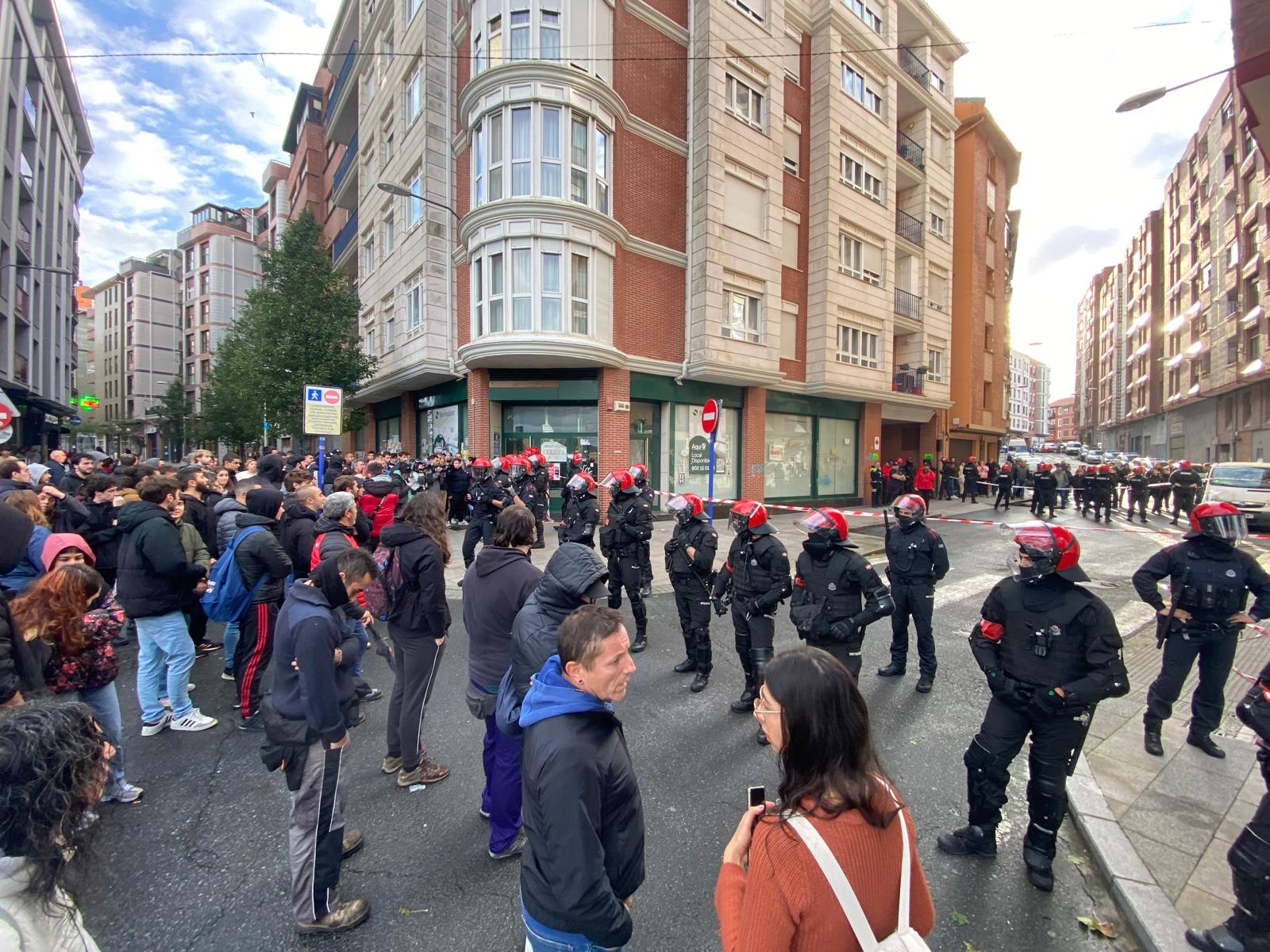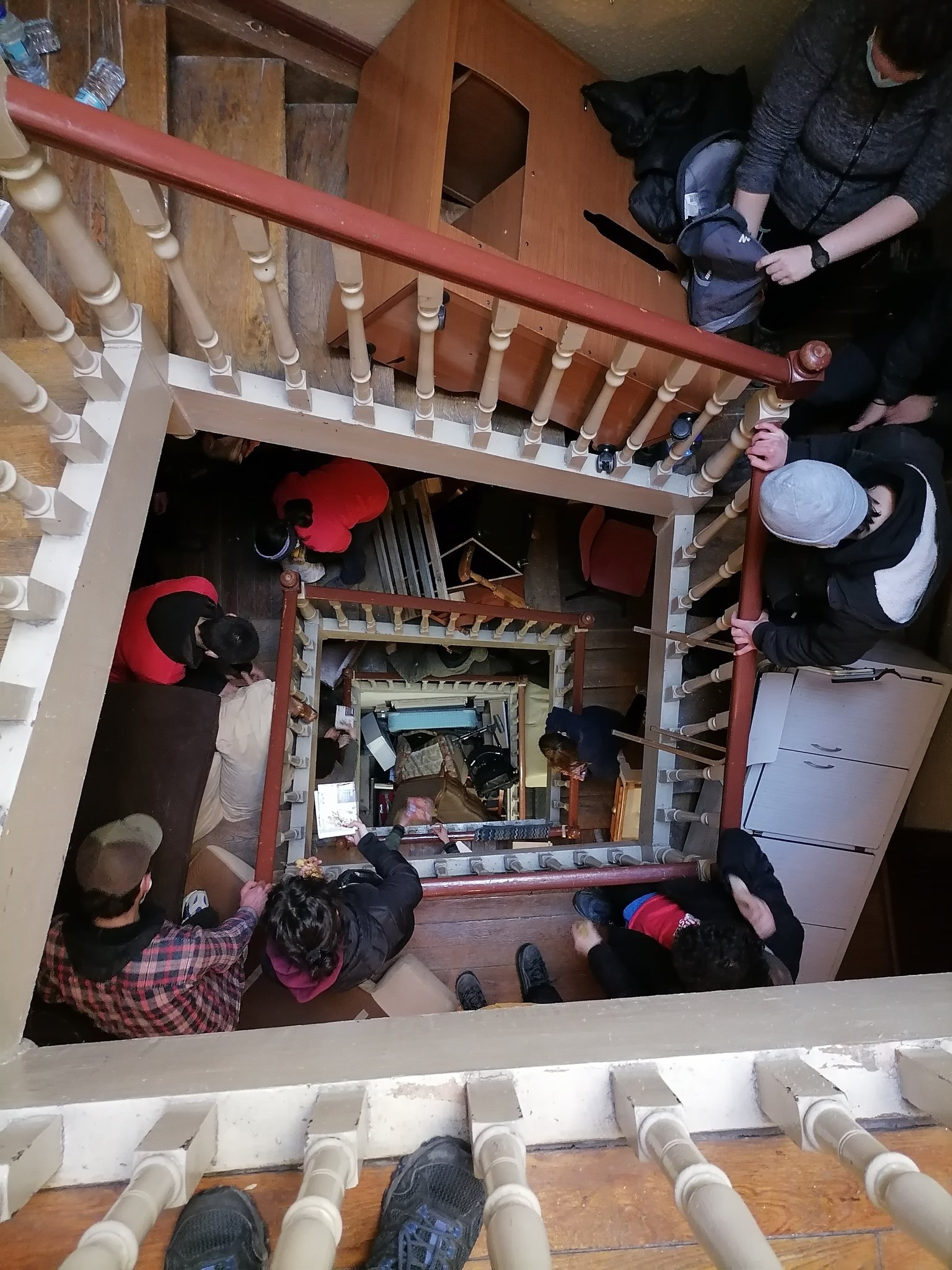A business without borders
- Tourism has become the first economic sector in San Sebastian in recent years, although the pandemic called it into question. The urban space is being transformed and the vital connections of the neighbors with it. Aware of the importance of the phenomenon, the team of geographers Haritik Hiriko has launched an in-depth investigation into the leading multinational in the tourism rental sector, Airbnb. We added a fact: we spent the night in San Sebastian and the average breakfast price was 203 euros last year. This price is more expensive than the average for Paris, New York or Barcelona.

At the time of the pandemic, it seemed that the tourist rental would go down and, made impossible for months or years, would return those apartments to ordinary rentals. There and here we heard the owners who were about to do so. Time has shown that when after the pandemic we talked about “nothing will be the same”, at best it was an innocence and things have not changed so much. This is the case with the tourist rental market. Its effects were combined with the emergence of a pandemic in unlimited ascent and breathing. With the advent of the pandemic, the market for tourist apartments resurfaced again, recovering the rapidly lost expansion.
San Sebastian is one of the cities that receives the most tourist rentals in Euskal Herria, and the current expansion of this market is a relatively recent phenomenon, which has provoked debates. To put it in context, in the Autonomous Community of the Basque Country, at the end of 2022 Airbnb had 6,708 ads, of which about a quarter was in San Sebastian, 1,649. This platform reached 1,800 ads in the Gipuzkoan capital between 2017 and 2018. In the last year, the Municipal Government of San Sebastian published a new Ordinance for the regulation of tourist rentals, which affected one year, as in March 2019 it decreased to 1,437, continuing with the effect of the pandemic until reaching 1,311 in December 2020. But, as we have said, this sector has soon left the pandemic, and in September 2022 the platform had 1,659 ads in the city and with that growth rate will break the 2018 mark. In this context, the research carried out by Haritik Hiriko provides many explanatory data on this type of business and refutes other mantra.
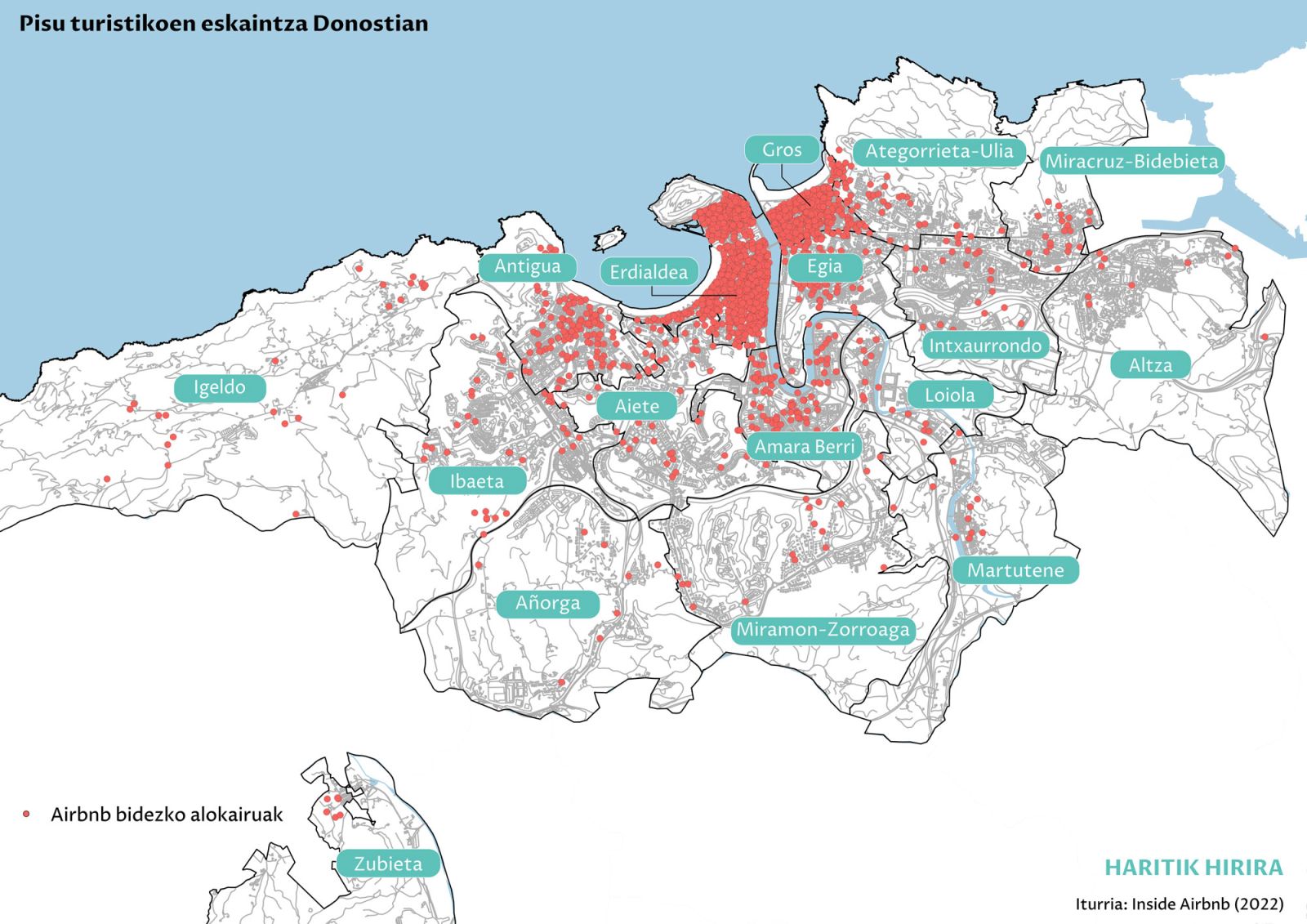
Not an alternative to hotels
As the study points out, Airbnb was born as a “nice” alternative to hotels and hostels: Airbnb means inflatable mattress and breakfast in English. In the context of the bubble of the collaborative economy recovered by capitalism, the platform was born with the intention of uniting alternative travelers with generous people in the area to break the hotel business and exchange experiences. In addition, as everyone can put an ad, those who come right at the end of the month can also rent a room from their home to raise funds.
But the data has belied it. Firstly, who has the possibility of renting a room or even a whole house? The richer it is, the higher the number of homes and spaces, so it is easier to use this type of rental. In addition, the tourism rental sector is an already monopolised and professionalised sector. Data from the study indicate that in 2017 users who offered a single home in the city were 79% of the total, while those who offered two or more were 21%. This second group, however, represented 61.34% of the total housing offered. In September 2022, there were 730 users on the Airbnb platform, of whom 528 offered a single home and 202, two or more. That is, the simplest users, the majority (72.33%) offered a third. But 27.67% of growing users, the most powerful, concentrate most of the supply: 68.17%.
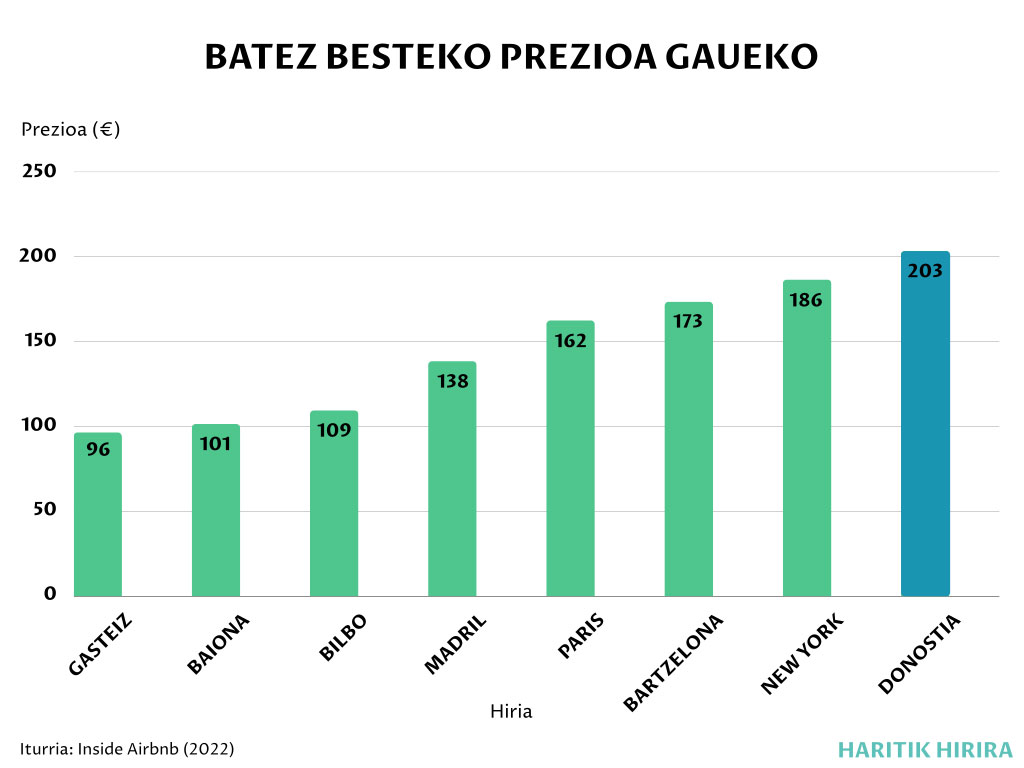
In Donostia-San Sebastián, therefore, the majority are small users, but in a decreasing proportion, while the large, minority ones control most of the market and accumulate even more. On the other hand, customers are not within reach of all overnight stays via the platform: in September 2022 you had to stay in San Sebastian and pay an average of 203 euros for breakfast, taking into account both homes and single rooms. This price is more expensive than the average for Paris, New York or Barcelona.
Accumulated in the center
Another idea that has been spread around this platform and that it hardly really has is that it is an alternative to traditional hotels and hostels. The study reveals that it has partially achieved an expansion that hotels and pensions have not achieved for decades, and that it has reached places where they did not arrive. And in view of the increase it has experienced in recent years, it is like this. However, in its spatial position, the tendency of Airbnb has been to settle in the already overexploited central neighborhoods: six years ago 60% of the offer was concentrated in Gros, Downtown and Old Part, and in September 2022 65%. Moreover, within the overall growth of the last year, except in the neighborhoods of Añorga, Miramon-Zorroaga and Zubieta, the central neighborhoods are the ones that grow the most, although they are already saturated.
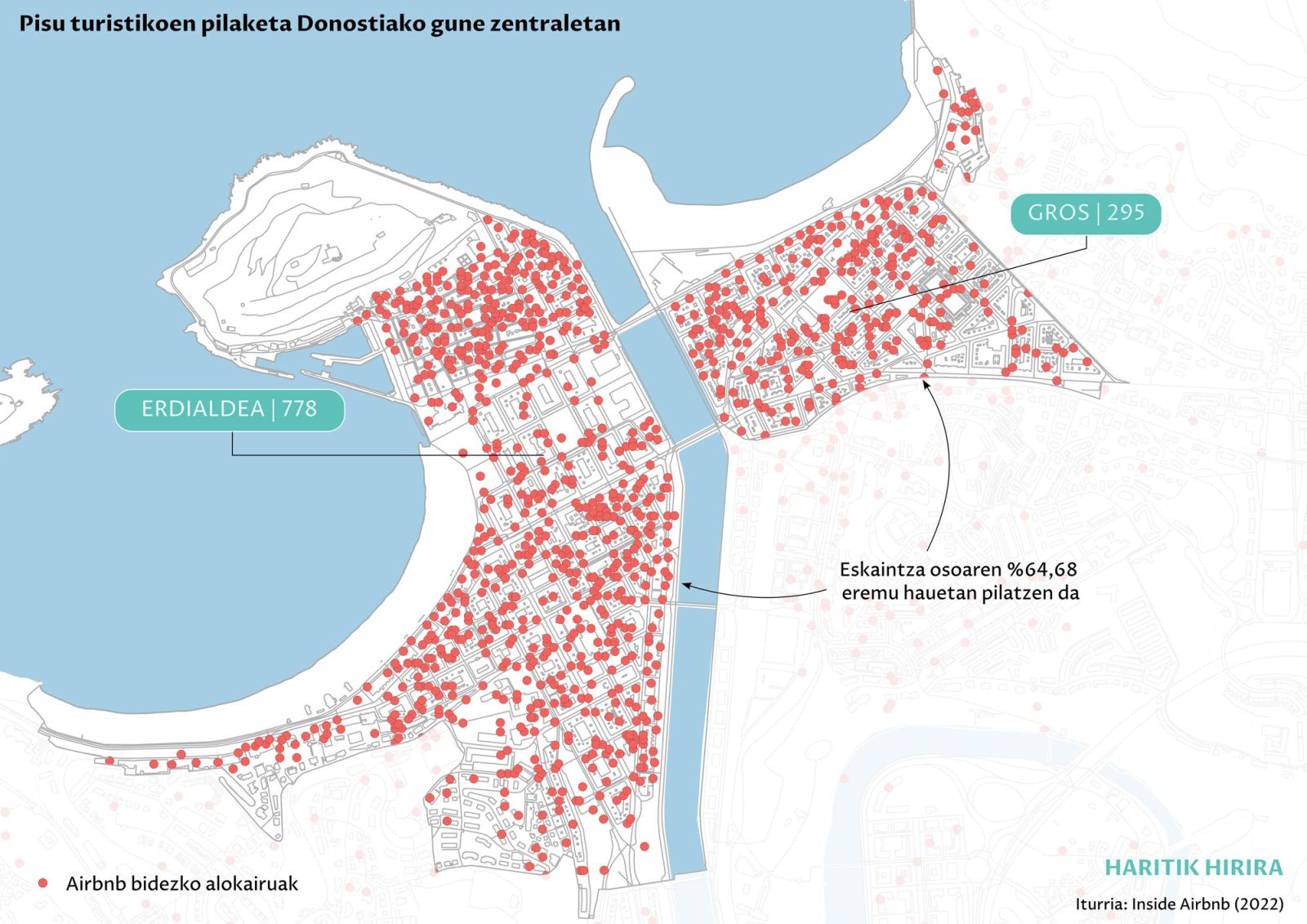
According to the zoning carried out by the City Hall itself, area A (Parte Vieja, declared an area saturated by the City Hall itself) has grown the most in the last year, with an increase of 21.31% between the months of September 2021 and 2022. Area B (Gros, Centro, Amara, Miraconcha and some already heavily exploited areas of Old and Egia) has grown by 17.35 per cent. And finally, the underweight neighborhoods, zone C, 12.4%.
Despite the proportion between the number of ordinary dwellings and the number of tourist rentals, neither 1% of the total dwellings in low-income neighbourhoods are for tourist rent. In high-income areas, between 6% and 8% of homes are offered by Airbnb. In other words, the areas with the most tourist pressure are the ones that continue to grow, to which must be added other tourist rentals, hotels and pensions. The study also shows that very few users are looking to get an extra amount of money through Airbnb to reach the end of the month, as in the lower income neighborhoods there are hardly any offers.
Current rentals decreasing
In recent years, the impact of tourist rentals on citizens who want to live in ordinary rent has been discussed and, therefore, the degree of expulsion from their neighbours. Although this causality is difficult to prove, the data of the study indicate that in San Sebastian tourist homes are increasing the price of ordinary rentals and thus eliminating people. In recent years, after the calm after the outbreak of the brick bubble in the 2008 crisis, housing has become a speculative space for vulture funds, investors, capitalists and large owners and not so large.
In Donostia-San Sebastián, with one of the highest rent prices in the Basque Country and the Spanish State, in recent times has increased considerably, going from 12.9 euros per square meter in April 2017 to 15.9 euros in September 2022, an increase of 23.26%. This has already brought problems to the working class people who want to live for rent in San Sebastian. But within the same time frame, Airbnb rentals have increased by 60.72 percent, 2.5 times more than normal rentals.

The study notes that the profitability of tourist rentals may be three times higher than that of ordinary rental. Transforming housing into a speculative market, who seeks profitability will abandon the ordinary rental and place their properties for tourist rent. Thus, in many neighbourhoods, many of the homes that could be used for ordinary rental have become tourist homes, which has considerably reduced the supply of ordinary rentals. Moreover, low supply and high demand allow owners to raise prices.
The study insists that the neighborhoods that lost the most population in the city between 2000 and 2020 were Centro, including the Old Part, and Gros, with 5.63% and 12.82% respectively. Therefore, the neighborhoods of downtown San Sebastian are those with the greatest speculative pressure, including the largest number of tourist rentals, and those that have suffered the greatest loss of population, making it difficult to decouple.
Losing neighbors
The study, besides performing an X-ray of the Airbnb market in San Sebastian, highlights the damage this business causes to the neighbors. The transformation of housing into tourism implies the displacement or expulsion of a person, causing the loss of networks of communities and neighbors that have emerged in the neighborhoods for a long time. In reference to other studies, the report shows that “the displacements of everyday visitors mean the rupture of the emotional and material adhesion of the neighbors to the neighborhood or area in which they live” and that the process that occurs in the neighborhood causes expulsion and feelings of anguish. It also stresses that the professionalized tourist housing sector generates “long chains of work”, generally hidden and precarious: cleaning personnel, maintenance personnel, receptionists, etc. Bad works for the neighbors, in order to pay for the scarce and expensive housing.
Meanwhile, Brian Chesky, Nathan Blecharczy and Joe Gebbia, founders of Airbnb, accumulate 8,300 million, 7,280 million and a sum of 7,090 million euros, respectively, from tourist housing commissions rented around the world. This gigantic company leaves little of the collaborative economy mentioned at the beginning.
Municipal limits are insufficient
But some have tried to deal with the consequences of their activity. On March 26, 2018, the Municipal Government of San Sebastian, formed by the PNV and the PSE-EE, published a new ordinance with the aim of limiting the length of the tourist rentals. However, the report clearly shows that it has not had the effect it needed, if it ever had that intention and on this march, it will soon exceed the mark established in the city with 1,800 tourist homes in 2018.
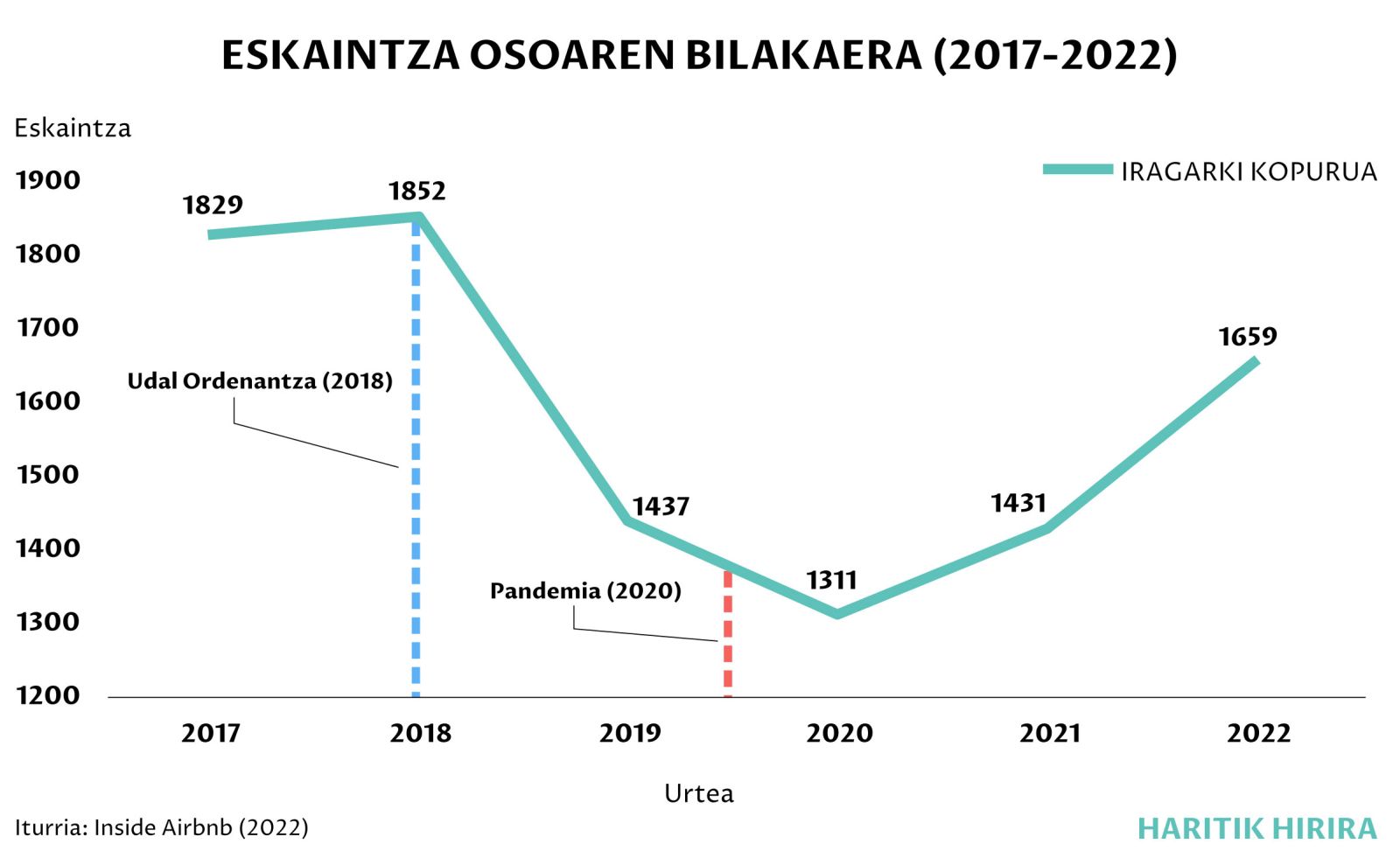
The Ordinance was developed with the objective of mitigating high pressure areas, but the mentioned zonal growth data show that this has not happened. The Old Party was declared a saturated zone, so no more tourist rentals can be launched than those processed at the entry into force of the Ordinance. However, in the last year it is where the tourism rental increases in percentage. And then the central neighborhoods of the city that have grown the most have been those that had a lot of tourist pressure. According to the study, this ordinance is not sufficient to curb the growth of tourist rentals and has not served to alleviate this pressure.
Tourist housing ban guide
Beyond the City Ordinance, many other agents and individuals have tried to set limits on the market for tourist rentals. Among them, the Saretxe housing union in the Gros neighborhood has launched a campaign to ban this type of rent in the neighboring communities. As mentioned in the report, Gros is one of the neighborhoods with the highest presence in San Sebastián and one of the neighborhoods that has lost the most.
A brief guide has been published on how to ban tourist homes and is now opening from home to home. To this end, it is sufficient to put the item on the agenda of Community meetings, to vote and to vote in favour of three out of five neighbours. Once this result has been registered, it will be legally forbidden to install new tourist rentals in the building, as this measure does not affect existing ones.
Aljeriatik datoz Mohamed eta Said [izenak asmatuak dira], herri beretik. “Txiki-txikitatik ezagutzen dugu elkar, eskolatik”. Ibilbide ezberdinak egin arren, egun, elkarrekin bizi dira Donostian, kale egoeran. Manteoko etxoletan bizi ziren, joan den astean Poliziak... [+]
Espainiako hedabideetan aurkitu dugu albistea, salaketa egin dutela Fotocasa eta Idealista etxebizitza-atarien kontra, prezioak manipulatzen dituztelakoan. Salaketan ez dugu manipulazioaren deskribapen zehatzik aurkitu, baina Ameriketako Estatu Batuetan agertu den salaketa... [+]
Ez da gauza berria politikari profesionalak gizarteko arazoak estaltzeko ahaleginetan ibiltzea. Azkenaldian Denis Itxaso -EAEko Etxebizitza sailburua- entzun dugu etxegabetzeei garrantzia kenduz eta aditzera emanez gurean bazterreko fenomenoa direla; eta Begoña Alfaro... [+]
Azpeitiko Udalak etxebizitza hutsei ezarritako kanona abian jarri berritan –eta Euskadi osora zabal daitekeela jakinda–, etxebizitza horien jabeen eta eskuineko alderdien kexak irakurtzen eta entzuten hasiko gara. Jabetzarako Eskubidearen inguruko mantra horiek... [+]
Azora putre funts alokairua igo eta mantentze lanak alde batera utzi ditu, Isaac Lagos eta bere familia etxebizitza uztera behartuz. Kaleratzearen aldeko epai bat jaso berri du maizterrak.
Plataformak "atzerapausotzat" hartu du Eusko Jaurlaritzako Etxebizitza eta Hiri agendako sailburu Denis Itxasok berriki iragarri izana lurzoru urbanizagarrietako etxe babestuen proportzioa %75etik %60ra jaistea. Pradales agintera iritsi zenetik alokairu soziala eskatzen... [+]
Etxera itzuli ahal izan diren arren, joan den azaroan kaleratu zuten Astrabuduko familia berriz ere arriskuan dago. Uribe Kostako Etxebizitza Sindikatuak salatu du mailegu-enpresa berriz ere saiatzen ari dela kanporatzea gauzatzen, oraingoan, desokupazio-enpresa bat... [+]
Azken boladan gero eta gehiago entzuten dugu gazte askok etxebizitza erosteko ahalmenik ez dugula. Batzuetan, badirudi ez dagoela beste gairik; egia da gai serioa dela. Niri neuri ere, 31 gertu izan arren, oraindik pixka bat falta zait neurea izango den etxebizitza lortzeko... [+]
Azken egunak garrantzi handikoak izan dira Bartzelonan, etxebizitzaren aldeko mugimenduarentzat eta espekulatzaileen aurkako borrokarentzat. Urtarrilaren 28an, polizia-armada batek Raval auzoko Massana Zaharrari [zentro sozial okupatua] eraso egin zion goizaldean, aurrez abisatu... [+]











